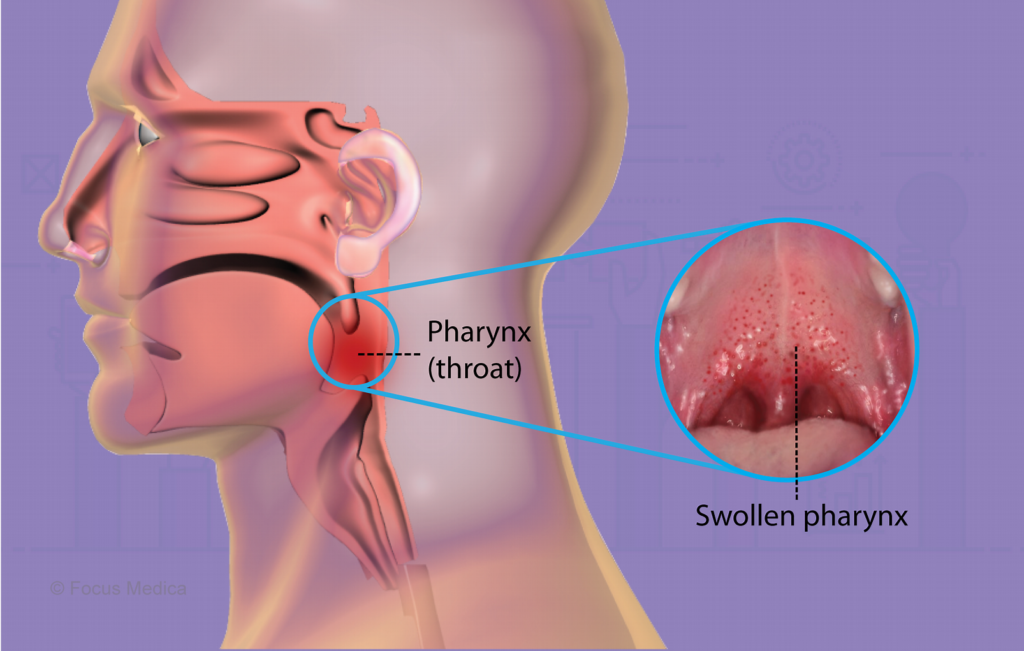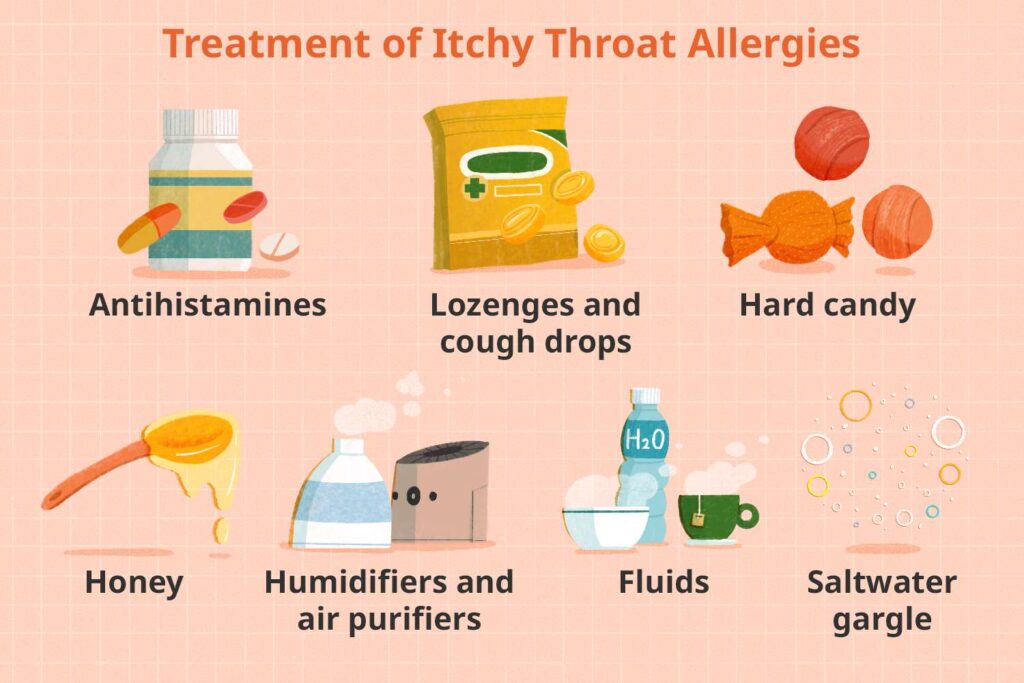A sore throat, or pharyngitis, is a common condition that can cause discomfort when swallowing or speaking. It can be caused by various factors, including infections or irritants. Understanding the causes, symptoms, and treatment options can help you find relief and know when to seek medical care for a sore throat.
Sore Throat (Pharyngitis)
Pharyngitis causes a scratchy or burning sensation in the back of your throat, making it painful to swallow or talk. It’s often caused by viral infections like the cold or flu. You may also experience a cough or runny nose. These symptoms typically clear up within three to ten days.
What is a sore throat?
A sore throat, also called “pharyngitis,” feels scratchy and painful at the back of your throat. This happens when the lining of your throat becomes inflamed. You might find it hard to swallow or talk.
There are many reasons you might get a sore throat, like viral or bacterial infections, allergies, or even sleeping with your mouth open. Most sore throats improve on their own with simple home care in a few days.
However, if your sore throat lasts more than a week, gets worse, or you notice symptoms like a fever or swollen glands, it’s important to see a healthcare provider.
At Digital Pakistani, we believe in taking care of your health and staying informed about common issues like sore throat.
Types of pharyngitis
There are two main types of sore throats:
- Acute pharyngitis: This type lasts for about 3 to 10 days and is the most common.
- Chronic pharyngitis: This type lasts more than 10 days or keeps coming back.
Doctors use these terms to understand how long your sore throat has been bothering you.
What are the symptoms of a sore throat?
- Pharyngitis often begins with a scratchy or dry sensation in your throat. As it gets worse, you may feel sharp pain when swallowing or talking. The discomfort can even spread to your ears or neck.If the throat irritation is due to an infection, you might also experience symptoms like:
- Headache
- Upset stomach
- Swollen lymph nodes
- Stuffy or runny nose
- Cough
- Fatigue
- Hoarseness
- Red or swollen throat and tonsils
- White patches or spots on your throat or tonsils
These symptoms can help you figure out if an infection is behind your sore throat.
What causes a sore throat?
Most sore throats are caused by colds or flu. Other causes include:
- Bacteria: Infections like strep throat.
- Tonsillitis: Swollen tonsils.
- Allergies: Pollen or dust can cause mucus to drip and irritate your throat.
- Acid reflux: Stomach acid can cause a burning feeling in your throat.
- Irritation: Yelling, spicy food, smoking, or hot drinks can hurt your throat.
- Mouth breathing: Sleeping with your mouth open can dry out your throat.
- Tumors: Rarely, a sore throat can mean something more serious like throat cancer.
These are common reasons for a sore throat.
How is pharyngitis diagnosed?
Your doctor will ask about your symptoms and examine your throat, tongue, and possibly your ears. They might also do a strep test to check for strep throat.
Testing helps the doctor determine whether your throat issue is caused by a virus or bacteria, which is important for deciding the right treatment.

How is a sore throat treated?
Treatment for throat discomfort depends on the cause. If it’s due to a virus, it usually clears up on its own within a week. Your doctor might recommend over-the-counter (OTC) medications to help relieve the pain.
Here are some other treatment options for throat irritation:
- Antibiotics: If you have a bacterial infection, you may need antibiotics, usually taken for about 10 days.
- OTC antihistamines: These can help dry up mucus from allergies that might be causing your sore throat.
- OTC antacids: If acid reflux is the problem, antacids can help. Avoiding large meals before bed can also reduce reflux.
- For very bad sore throats, like those caused by serious illnesses, your doctor might give you a special mouthwash. This “magic mouthwash” has ingredients like a numbing agent, Benadryl®, and Maalox® to help relieve the pain.At Digital Pakistani, we want to keep you updated on simple and helpful treatments, like this special mouthwash, for managing sore throats.
These treatments can help make your sore throat feel better.
How can I prevent a sore throat?
Viral infections like colds and the flu often cause throat pain. You can reduce your risk by taking a few precautions:
- Stay up to date with your flu and COVID-19 vaccinations.
- Wash your hands frequently with soap and water or use hand sanitizer.
- Avoid sharing food, drinks, or utensils with others.
- Keep your distance from people who are sick.
- If you’re feeling unwell, try to stay away from others to prevent spreading germs.
These simple steps can help protect your health and reduce the chances of getting throat discomfort.

What questions should I ask my healthcare provider?
Here are some questions you might want to ask your doctor:
- What’s causing my throat discomfort?
- How can I tell if it’s getting worse?
- Do I need treatment, or can I manage it at home?
- How long will it take to get better?
A note from Cleveland Clinic:
Your sore throat might have started as a small tickle, but now it’s painful and hurts when you swallow or talk. Most sore throats are caused by viral infections and usually get better within a week. If it’s a bacterial infection, you may need antibiotics.
At Digital Pakistani, we’re here to provide simple and clear advice to help you understand and manage common health issues like a sore throat.
Fortunately, many home remedies can help relieve throat pain. However, if the discomfort lasts more than a week or keeps returning, it’s best to see a doctor, as it could indicate a more serious issue.
